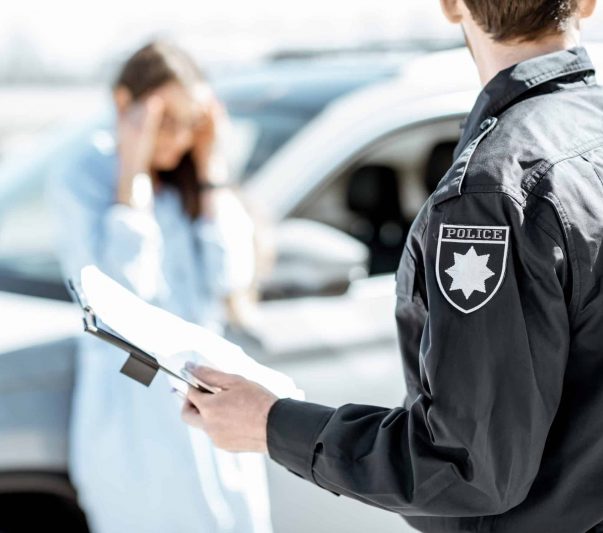In Colorado, you must report a car accident if it results in injuries, death, or property damage. Following an accident, you should check to see if anyone is injured and call 911 for assistance. You’re required by law to remain at the scene and render reasonable assistance to anyone who is injured.
How to Report a Car Accident in Colorado
If a police officer comes to the scene, you do not have to file a report yourself or do anything other than cooperate with the officer’s investigation. The officer will complete a report and make it available to the public, generally within 7-10 days. You should answer the officer’s questions honestly, but try not to volunteer additional information and avoid speculating about who was at fault. You should never say that you think you were at fault – it can be hard to judge responsibility without having all the information about an accident, and many people are incorrect about fault.
If an officer doesn’t come to the scene, you must file a report online within 60 days. Generally, this information is stored for seven years for record-keeping, but law enforcement will not investigate the crash.
Sometimes local law enforcement is busy with other issues, and your accident is relatively minor. In this case, they may not send an officer to the scene but will instead take your report over the phone. After answering their questions, you should ask if you need to follow up or file your own report later.
What Else Should You Do After a Car Accident in Colorado?
Get Medical Attention Right Away
After an accident, even if you think your injuries are minor, get medical attention immediately. We often meet people who tell us that they’ve had some lingering pain since an accident that happened weeks ago. But when we ask if they went to the emergency room or saw a doctor, they say no – they didn’t think it was serious.
There are a number of reasons why people sometimes don’t get the medical care they need after a car crash:
- They think their injuries are too minor to bother with seeing a doctor. In some cases, symptoms from an injury may sneak up on you. An accident can be very frightening, and the associated adrenaline rush often suppresses pain so that you might have felt little or nothing right after the accident. But when the adrenaline wears off, you will probably notice the pain worsening. At this point, you’re already convinced that your injuries are inconsequential and you will feel better soon. Sometimes people spend several days thinking they will feel better soon before realizing their pain isn’t going away.
- They have concerns about the cost of medical care. We get it. Medical care is expensive; some people avoid it if they don’t think their injuries are severe. Unfortunately, sometimes putting off care can mean more expensive medical bills later. We recommend seeing a healthcare provider promptly and saving a copy of your medical bills. Your lawyer will seek compensation from the at-fault driver’s auto insurance policy or, in some cases, your own car insurance.
- They don’t want to wait for hours at the emergency room. This is also understandable. You have a life, and the accident may have already taken up several hours of your time, but you don’t have to go to the emergency room if your injuries are not life-threatening. Instead, you could try an urgent care clinic or see your family doctor. You should try to be seen within a day or two of the accident, but it doesn’t have to be at a hospital if your injuries don’t appear severe enough to warrant one.
While it’s common for people to brush off injuries that don’t seem serious at the time, it could complicate your treatment and affect your ability to pursue compensation. Sometimes waiting to get medical care can result in a minor injury getting worse, which might mean that it takes longer for you to recover.
The longer you wait to seek medical attention, the more likely it is that an insurance adjuster reviewing your claim will say, “If you were really injured, you would have gone to a doctor sooner.” We know that isn’t necessarily true, but to an insurance adjuster, it’s a perfectly good excuse to deny your claim.
Talk to a Colorado Car Accident Lawyer
Getting legal advice after a car accident is always a good idea. Yes, even if the other party says they’ll cover the costs.
After the accident, exchange contact and insurance info with the other driver. If the other party doesn’t want to give you their insurance info because they want to pay out of pocket, you should still try to get that information. If they refuse to give it to you, let the responding officer know. They have a duty to verify insurance information and can get it for you if necessary.
Once you have the other driver’s information, speak with a lawyer about your car accident. Your attorney will help you identify all your damages, such as:
- Medical bills. Any current medical bills and future expenses – if you need further care related to your injuries – count as damages.
- Lost income. Keep track of how much time you had to miss at work because of your injuries.
- Lost earning potential. What if your injuries were more severe and caused a permanent disability that prevents you from ever returning to work? Or, what if you can work, but not in the same job, or for the same number of hours every week? In these situations, you would have suffered lost earning potential, and you also deserve compensation for that.
- Permanent disability or disfigurement. Whether or not it affects your ability to work, you can seek damages for any permanent disability resulting from your injuries.
- Pain and suffering. Your physical and mental pain stemming from the accident should not be ignored when calculating damages.
- Property damages. You’ll want to cover the costs of repairing or replacing your vehicle.
- Wrongful death. If you’ve lost a loved one in a car accident, you can seek several types of damages, including loss of consortium or companionship, loss of financial support, medical expenses related to the accident, funeral or burial costs, and pain and suffering.
Most people don’t have the knowledge and experience to calculate all these damages themselves, and the insurance company knows it. That’s why we highly recommend you speak with a lawyer before accepting any offer from an insurance company. It’s natural to think that a settlement offer is a good thing – they didn’t deny your claim, right? But it’s essential to ensure any settlement offer covers all of your damages, and your Colorado car accident lawyer can help you with that task.
Car accidents can cause life-altering injuries and leave you with significant financial burdens. If you’ve been hurt due to someone else’s negligence, you may have the right to compensation. Our car accident lawyers are here to help you get justice.
What If the Insurance Company Denies My Claim?
The best way to avoid an insurance company denial is to seek help filing your claim from an experienced attorney. We can ensure the forms are filled out so that it will be very difficult for the insurance adjuster to misinterpret your meaning. Remember that the insurance adjuster will be looking for anything they can use as an excuse to deny your claim.
However, it’s not too late to seek legal help if your claim has already been denied. Your lawyer will work to refute the insurance company’s argument that you were at fault or that the claim isn’t covered for some other reason.
How Does Modified Comparative Negligence Affect My Claim?
If denying your claim isn’t an option, the insurance adjuster may instead undervalue it. Colorado law uses modified comparative negligence statutes, which means that the other party doesn’t have to be 100 percent at fault for you to collect damages. They have to be mostly at fault, and any percentage of fault that you have will be taken off your eventual settlement. In practice, it might look something like this:
You were going a little over the speed limit, but the other driver ran a red light. They claim the accident was your fault because you couldn’t stop in time…after they ran a red light. It probably won’t be challenging to show the other driver was primarily at fault here, but the insurance company could still claim that you were 20 percent at fault. If you have $20,000 in damages, they might offer you $16,000 due to your percentage of fault.
You could accept this settlement, but you might be losing money you deserve for your injuries. In a situation like this, an attorney could be very helpful. We might argue that even if you had been going ten miles an hour slower, you still couldn’t have stopped in time after the other driver ran a red light. Or, we could also agree that you might have contributed to the accident slightly but not as much as the insurance company believes. Instead, we might suggest that 5 percent is all the responsibility you can be expected to accept. In many cases, we can obtain a larger settlement for the client than the insurance company initially offered.
Contact Olson Personal Injury Lawyers for Help with Your Car Accident Case
If you’re dealing with the aftermath of a car crash, you need help from an experienced Colorado car accident lawyer. Attorney Sean Olson established the Olson Personal Injury Lawyers to help injured people seek the compensation they deserve. He’ll personally listen to your story, review the details of your case, and explain your options for seeking compensation. Give us a call at (970) 633-3673 to see how we can help.







